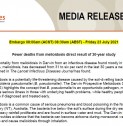Aim:
The aim of the Closing the loop on life-threatening melioidosis infections: observational research informing clinical practice change and policy for adults with severe kidney disease study is to determine the efficacy and safety of prophylaxis with daily oral TMP/SXT for melioidosis in haemodialysis patients from the Top End during the wet season from November 2014 to April 2015.
Summary:
Territorians who need dialysis to manage severe kidney disease were among a very high risk group susceptible for melioidosis infections and related harms[1]. In response to this, we undertook this study.
Implications for policy and practice:
This practice has been successfully embedded in standard care in the Top-End of the Northern Territory.
Our research has found:
Melioidosis risk can be significantly minimized in this high risk group through a comprehensive strategy providing useful and meaningful information to clients and dialysis health care staff, along with the antibiotic prevention treatment.
Chief investigators:
- Jaqui Hughes
- William Majoni (Royal Darwin Hospital)
- Bart Currie
- Bianca Heron (Royal Darwin Hospital)
Start date:
September 2014
[1]
- Chalmers, R.M., Majoni, S.W., Ward, L., Perry, G.J., Jabbar, Z., Currie, B.J. (2014). Melioidosis and end-stage renal disease in tropical northern Australia. Kidney International, 86(5), 867-70.
- Jabbar, Z., Currie, B.J. (2013). Melioidosis and the kidney. Nephrology, 18(3),169-75.
- Majoni, S.W., Heron, B., Hughes, J.T. & Currie, B.J. (2016). Trimethoprim/sulfamethoxazole (TMP/SXT) prophylaxis to reduce rates of meliodosis in high risk haemodialysis patients in the Top End of Australia. Nephrology, 21(S2),118.
Funders:
- The 2016 Harry Christian Giese Research into Action Award.
-

Melioidosis: More cases of potentially fatal bacteria from NT dirt emerge
More people are being infected by a potentially fatal bacterium in the Northern Territory, and health experts suspect building works could have something to do with the rise in cases.
-
Source water key to bacterial water safety in remote Northern Australia
In the new work, Mirjam Kaestli of Charles Darwin University, Australia and colleagues including Menzies School of Health Research sampled water and biofilms from three remote Indigenous communities in Australia’s Northern Territory.
-
Media Release | Source water holds key to bacterial water safety in remote North
CDU Research Fellow Mirjam Kaestli and colleagues including Menzies School of Health Research sampled water and biofilms from three remote Indigenous communities in the Northern Territory.
-

Killer disease strikes crocs
Melioidosis is killing Territory crocodiles, according to a paper written by researchers at the Menzies School of Health Research.
-

Media Release | Crocodile killing bacteria identified by Top End researchers
A ground-breaking study by a north Australian research team which identified a deadly bacterium responsible for killing saltwater crocodiles at a Top End Wildlife Park has recently been published in the journal, Microbial Genomics.
-

Tropical disease kills crocodiles in NT
A deadly tropical disease that affects humans was responsible for killing two crocodiles near Darwin, flipping previously held beliefs the predators were highly resistant to infection.
-
Deadly bacteria killed two crocodiles in northern Australia
The research, from Menzies School of Health Research was published in the Microbial Genomics journal.
-

Melioidosis research traces source to reduce spread
Dr Audrey Rachlin focused on the environmental bacterium Burkholderia pseudomallei, which causes melioidosis.
-
Tackling the Top End's deadly dirt disease at the source
The research through the Menzies School of Health Research by the newly graduated Dr Audrey Rachlin focused on the environmental bacterium Burkholderia pseudomallei, which causes melioidosis.
-
Fewer deaths from melioidosis direct result of 30-year study
The number of deaths /mortality rate in Darwin from an infectious disease found mostly in the tropics, melioidosis, has decreased from 31 to six per cent in the last 30 years a new paper published in The Lancet Infectious Diseases Journal has found.






